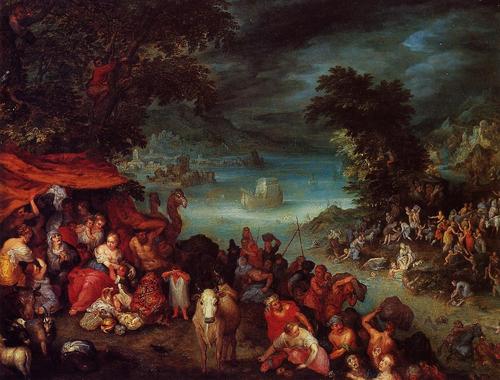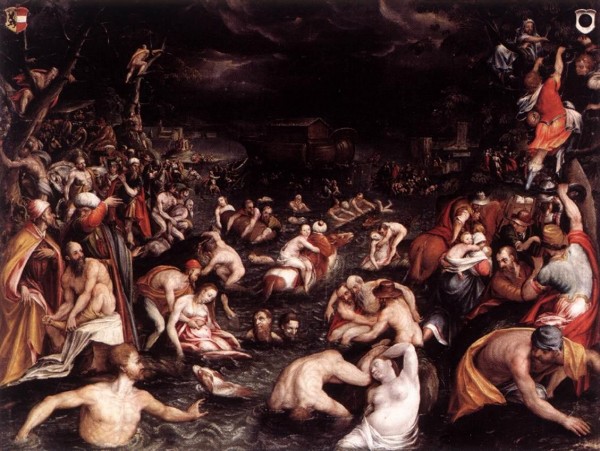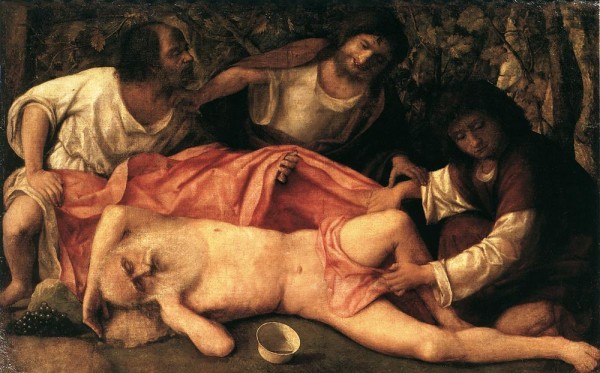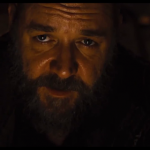
On Sunday, December 26, 2004 – you probably remember – a powerful earthquake caused a tsunami that, suddenly and without warning, ended the lives of 230,000 people in a few minutes. Before that, a cyclone whiped out 500,000 in Bangladesh. After, the Haiti earthquake killed 139,000. And so it goes, all the way back to Pompeii, to Noah.
We think we have control of our destiny, but our lives can end in a second, with an earthquake or a sinkhole or a misstep on the sidewalk.
This is the story of Noah. It is dark and horrifying.
Noah is the story of judgement, of a God who exterminated all but a tiny fragment of humanity in a devastating flood.
People wonder how a loving God could do such a thing, but as I learn more of the world, I marvel that He holds back his hand. When I think of a nine year old girl chained to a bed and forced into sexual slavery in Thailand, when I think of the suffering in North Korea, of little boys forced to carry guns and kill in Sudan, I think maybe a mass judgement isn’t such a bad idea.
Judgement carries the promise of justice, of freedom for that girl, of justice for that boy. Things being set straight.
When we think of Noah, though, we frame it as a story of redemption.
Why do we Christians usually place ourselves on the ark, as God’s faithful servant escaping His wrath as he brings judgement on the world?
We’re on God’s side. We, rightly, escape. Such assurance in our own righteousness.
But we are more likely to be the people who mock, who carry on with our lives, who scoff at the idea of getting on the ship, who wonder what those odd animals are doing but not enough to truly search, and who writhe in the water as it covers our heads.

We are all under judgement. We all live under the crest of the tsunami, ten seconds prior to the earthquake, the week before the flood.
The Biblical story we paint in cute sunshiny rainbows on nursery walls and teach to our children in sing-song.
The Lord told Noah there’s going to be a floody, floody.
Get those animals out of the muddy, muddy.
This is a story we would rather fit on a nursery wall than consider in its rawness. It is a story we would rather clap our hand to than hold our hands over our eyes weeping. Safer that way.
It is a story of our own death, our own peril under the inevitable hand of justice, the unrelenting hand of judgement, the hand that will come whether we die in our beds at a ripe age or on a normal September Tuesday in the Twin Towers.
This is what we cavalierly talk about when we talk about Noah.
It is also a story of a surviving. We frame this as victory, and it is, but it is a hard and heavy victory. When you speak to the ones who clung to a balcony as the water swirled around and claimed others, who walked out of the towers just before they fell, who sat on the right side of the airplane, they say, they know two things.
One, there was no particular reason they survived. They were not faster or smarter or stronger or better or more worthy.
Secondly, there was a reason they survived. God had a plan. A purpose for saving them.
They generally say this with a sense of heaviness, a Saving Private Ryan sense of burden. Even a touch of PTSD. When you carry the weight of those who died, you carry it forever. You carry it uneasily. We once knew this in the aftermath of World Wars, but most of us have forgotten.
This is also what we talk about when we talk about Noah. Responsibility that is unbearable. Memories that are searing. Trauma that is unexplainable. Carrying on after the unimaginable. No reason to boast. Only to fall on our knees.

No wonder the man drank. He was only human, which is to say weak and inadequate.
I am glad a director with the insight and dark vision of Darren Aronofsky has taken on this story. It needs to be removed from nursery walls. It needs to be de-stuffed-animalized. It needs to be woken up.
I trust the vision of a director of Black Swan, somehow, more than those of us who sing:
The sun came out and dried up the landy landy….
Everything was fine and dandy, dandy.
It was not fine. It was not dandy.
This is what we talk about. This is Noah.












